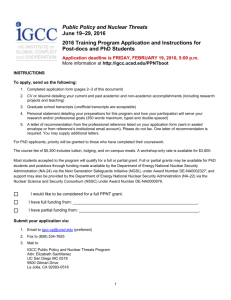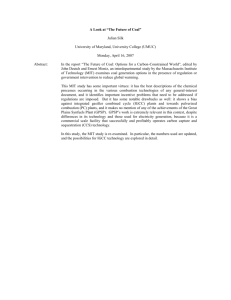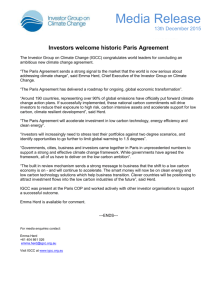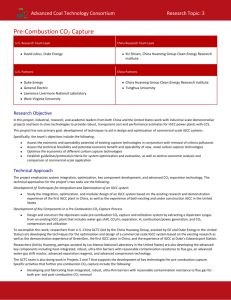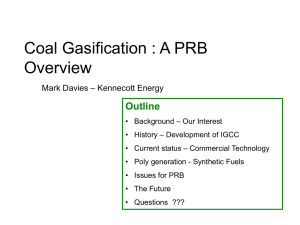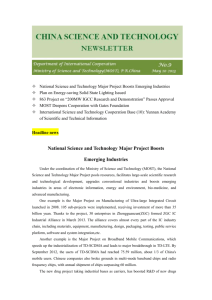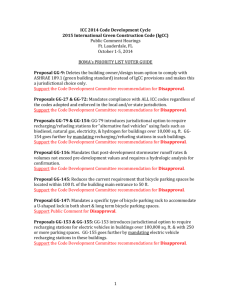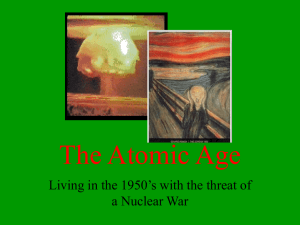2012 Annual Report - Institute on Global Conflict and Cooperation
advertisement
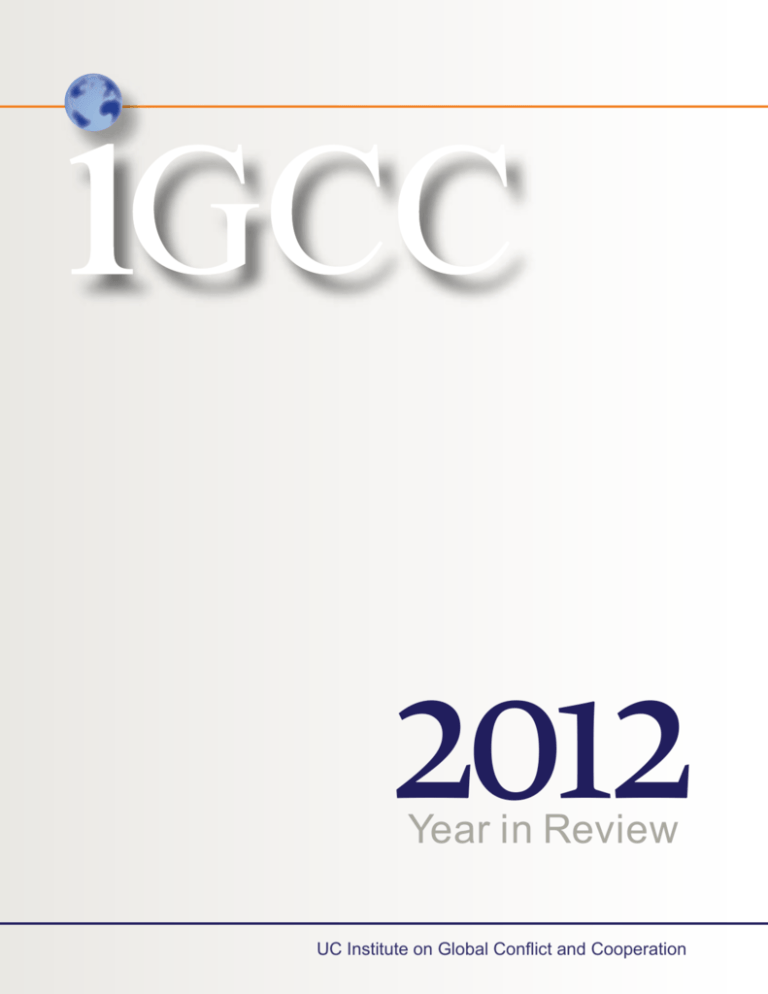
2012 Year in Review UC Institute on Global Conflict and Cooperation From the Director As the new director of the University of California’s systemwide Institute on Global Conflict and Cooperation (IGCC), it is an immense privilege to be in charge of one of the most vibrant and innovative centers of academic thinking on the great issues of peace, war, and development. 2012 was a busy year as IGCC carried out more than 30 conferences and workshops and two multi-week summer training programs as well as a robust schedule of lectures and briefings. New partners included the U.S. Naval War College, which cosponsored the SITC Conference on China and Cybersecurity, and the Institute of Nuclear Materials Management, which co-sponsored the Public Policy and Nuclear Threats Winter Conference in Washington, D.C. A UC-wide consortium of researchers in the emerging field of Environment and Human Capital, started by IGCC and funded in part by a grant from the University of California Office of the President, held its initial workshop in January 2012. Consortium members from UC Santa Barbara (UCSB), UC Berkeley (UCB), UCLA, UC San Diego (UCSD), UC Davis, and colleagues from Columbia, Stanford, and Tulane met to set an agenda for the group’s work and will meet again in early 2013. The initiative is led by IGCC Research Director for Environment Josh Graff Zivin. IGCC selected its first Nuclear Science and Security Consortium fellows as part of an effort headed by UCB’s Nuclear Engineering Department to train undergraduate and graduate students in the fields of nuclear physics, nuclear and radiation chemistry, nuclear engineering, nuclear instrumentation, and public policy. The multi-campus consortium was awarded $25 million by the National Nuclear Security Administration. Five fellowships of $20,000 each were awarded to UC students and three awards for collaborative research, programming, and education activities were awarded to faculty from UCB, UCSD, and UCSB. IGCC’s success in the most recent UC Office of the President lab fees competition led to an August 2012 award of $1.2 million over three years to fund dissertation fellowships. The Herb York Security Fellowship Program, named for IGCC’s founder, will provide stipends for approximately 42 fellows working in nine broad security-related areas: nuclear nonproliferation; terrorism; biosecurity; cyber-security; regional 2012 Year in Review 1 and major power relations; energy and environmental security; homeland security; defense; and nontraditional and emerging security. A major component of IGCC’s mission since 1983 has been support for UC graduate students through its dissertation fellowship competition. IGCC has funded more than 500 fellows to date. Twelve fellows representing five of the campuses received funding in the 2012–13 competition. The Herb York Security Fellowship Program award will enable IGCC to continue this important work. Around the world, researchers are looking for ways to activate Information Communications Technology networks to confound corrupt practices. Work by IGCC’s Development and Conflict Research group evaluating the use of cell phones to monitor elections is but one example. In June 2012 the group hosted “Evaluating 2 UC Institute on Global Conflict and Cooperation Mobile Innovations for Security and Accountability” at UCSD. The workshop, sponsored by the Department of Defense’s Minerva Research Initiative, brought together prominent researchers from six universities, NGO representatives, government policymakers, and socially-minded business executives from across the globe. Projects discussed included biometric payment systems for government welfare programs in India, the use of cell phones to monitor elections in Afghanistan and Uganda, using smartphones to better monitor low-level government officials in Pakistan, and facilitating cash transfers directly from individuals in developed nations to poor families in Kenya via cell phone. The workshop ended with a frank discussion of the challenges to policy implementation and of the tensions between conducting rigorous research and implementing policy in places where corruption and security issues are commonplace. Back-to-back workshops on China and cybersecurity in April 2012 sponsored by IGCC and the U.S. Naval War College invited Chinese and Western scholars and scientists to discuss the political, economic, and strategic dimensions of cybersecurity in China. China and the United States, the two largest economic powers in the world, depend upon global cyberspace for their economic productivity, social livelihood, and national security. Both governments and industry have become increasingly concerned about the safety and reliability of their information systems, but there remains great uncertainty about the true nature of risks and the best ways to address them. Western audiences in particular have had little exposure to Chinese perspectives and politics which influence these issues. The research findings, which are summarized in the report “China and Cybersecurity: Political, Economic, and Strategic Dimensions” span a wide variety of topics and interpretations, as should be expected from a policy issue spanning industrial regulation, law enforcement, military strategy, and civil rights concerns. 2013 will be the 30th anniversary of IGCC’s founding, and the work that we do in understanding the sources of global conflict and finding ways to further cooperation is becoming even more relevant and in demand in an increasingly complex and dangerous world. Tai Ming Cheung Director, IGCC 2012 Year in Review 3 UC COLLABORATION Since 1983, the University of California Institute on Global Conflict and Cooperation (IGCC) has generated innovative research into the causes of international conflict and cooperation. As a research unit serving the entire UC system, IGCC can build project teams from any of the ten UC campuses and the Lawrence Livermore and Los Alamos National Laboratories. IGCC brings researchers from all ten UC campuses and the Lawrence Livermore (LLNL) and Los Alamos National Laboratories (LANL) together with U.S. and international experts to investigate and develop solutions for pressing and long-term global challenges. UC scholars work together across social science and lab science disciplines on topics such as regional security, nuclear proliferation, innovation and national security, development and political violence, and climate change. IGCC prides itself on bridging the gap between the policy community and academic researchers to transform international policy and scholarly research. We work to enhance the visibility of the UC system through international, interdisciplinary projects and collaborations with national and international partners. 4 UC Institute on Global Conflict and Cooperation capital are complements to projects with a more traditional security focus. IGCC has provided ongoing leadership for preventive IGCC builds bridges between diplomacy in the theory and practice of the world’s international policy. most troubled regions through its Track II programs in the Middle East and Northeast Asia. In partnership with the state of California, IGCC experts help to train government officials in best practices for managing the aftermath of both FOUNDATIONS manmade and natural disasters. Founded by nuclear physicist Multi-week IGCC summer training Herbert F. York, IGCC’s original programs introduce young scholars emphasis on security and nuclear and mid-career professionals to the nonproliferation remains at its core, policy issues surrounding such topics but its agenda has broadened with as nuclear weapons, biothreats, and time. Today, IGCC researchers study development and conflict. a wide range of topics involving EDUCATION the security, environmental, and economic policies that shape IGCC is committed to educating our ability to prevent conflict and the next generation of international promote cooperation. problem-solvers and peacemakers through its research and teaching RESEARCH AND POLICY activities. The institute has Under the leadership of Director provided more than 500 Dr. Tai Ming Cheung, IGCC’s work fellowships to UC graduate in its core areas is balanced by the students. recognition that evolving threats to UCDC global stability require exploration of nontraditional connections Because of its commitment between and across disciplines to informing policy debates, and institutions. Projects in newly IGCC hosts regular events and emerging fields such as innovation fora in Washington, D.C., at the UC studies, cybersecurity, and human Washington Center (UCDC). 2012 Year in Review 5 IGCC’S Core Research Team Publication Highlights Tai Ming Cheung IGCC Director BOOKS Tai Ming Cheung is the director of IGCC and leader of IGCC’s Minerva project “The Evolving Relationship Between Technology and National Security in China: Innovation, Defense Transformation, and China’s Place in the Global Technology Order.” Cheung is a long-time analyst of Chinese and East Asian defense and national security affairs. He was based in Asia from the mid-1980s to 2002 covering political, economic, and strategic developments in greater China. He received his PhD from the War Studies Department at King’s College, London University in 2006. His latest book, Fortifying China: The Struggle to Build a Modern Defense Economy, was published by Cornell University Press in 2009. Cheung is an associate professor in residence at the School of International Relations and Pacific Studies at UC San Diego, where he teaches courses on Asian security and Chinese security and technology. T. J. Pempel, ed., The Economic–Security Nexus in Northeast Asia (London: Routledge, 2012). Henry D. I. Abarbanel Research Director for Science and Security Henry D. I. Abarbanel has served on the faculties at Princeton, Stanford, Northwestern, the University of Chicago, UC Berkeley, UC Santa Cruz, and, since 1982, at UC San Diego. He presently has appointments as professor of physics at UC San Diego and research physicist at the Marine Physical Laboratory, Scripps Institution of Oceanography. His research interests have ranged from elementary particle physics to the nonlinear dynamics of biological and physical systems. He was the founding director of UC San Diego’s Institute for Nonlinear Science, serving from 1986 through 2007. Since 1974, Abarbanel has been a member of JASON, a consulting group to the U.S. Government on technical matters. Abarbanel received his BS in physics from Caltech and his PhD in physics from Princeton University. Eli Berman Research Director for International Security Studies Eli Berman is a professor of economics at UC San Diego and a research associate at the National Bureau of Economic Research. His research interests include economic development and conflict, the economics of religion, labor economics, technological change, and economic demography. His latest publication is “Can Hearts and Minds be Bought? The Economics of Counterinsurgency in Iraq” (with Jacob Shapiro and Joseph Felter, Journal of Political Economy, 2011). Recent grants supporting his research have come from the Department of Defense, Department of Homeland Security, and the National Science Foundation. His book Radical, Religious and Violent: The New Economics of Terrorism was published in 2009 by the MIT Press. Berman received his PhD in economics from Harvard University. Joshua Graff Zivin Research Director for International Environmental and Health Policy Joshua Graff Zivin is professor of economics at UC San Diego, where he holds faculty positions in the School of International Relations and Pacific Studies and the Department of Economics. He is also a research associate at the National Bureau of Economic Research. In 2004–2005, he served as senior economist for health and the environment on the White House Council of Economic Advisers. Prior to joining UC San Diego in 2008, he was an associate professor of economics at Columbia University, where he directed the PhD program in sustainable development. Graff Zivin has published numerous articles on a wide range of topics in top economic, policy, and medical journals. His research focuses on health, environment, and development economics, frequently at their areas of intersection. He received his PhD in agricultural and resource economics from UC Berkeley. 6 UC Institute on Global Conflict and Cooperation Tai Ming Cheung, ed., China’s Emergence as a Defense Technological Power (London: Routledge, 2012). T. J. Pempel and Chung-Min Lee, eds., Security Cooperation in Northeast Asia: Architecture and Beyond (London: Routledge, 2012). Etel Solingen, ed., Sanctions, Statecraft, and Nuclear Proliferation (Cambridge: Cambridge University Press, 2012). Includes contributions by PPNT Fellows Wilfred Wan, David Palkki, and Celia Reynolds. PAPERS/REPORTS/MONOGRAPHS Eli Berman, Joseph Felter, Ethan Kapstein, and Erin Troland, “Predation, Economic Activity, and Violence: Evidence from the Philippines,” NBER Working Paper, September 2012. Lewis Branscomb, Ryan Ellis, and Mark Fagan, “Between Safety and Security: The Policy Challenges of Transporting Toxic Inhalant Hazards,” Journal of Homeland Security and Emergency Management (October 2012). Lewis M. Branscomb and Andrew A. Rosenberg, “Science and Democracy,” Scientist, October 1, 2012, http://thescientist.com/2012/10/01/science-and-democracy. Michael Callen and James D. Long, “Institutional Corruption and Election Fraud: Evidence from a Field Experiment in Afghanistan,” working paper, March 2012. Luke N. Condra and Jacob N. Shapiro, “Who Takes the Blame? The Strategic Impact of Collateral Damage,” American Journal of Political Science 56, No. 1 (January 2012): 167–87. Dieter Ernst and Barry Naughton, “Global Technology Sourcing in China’s Integrated Circuit Design Industry: A Conceptual Framework and Preliminary Findings,” East-West Center Economics Working Paper, August 2012. J. Graff Zivin and M. Damon, “Environmental Policy and Political Realities: Fisheries Management and Job Creation in the Pacific Islands,” Journal of Environment and Development 21 (2012): 198–218. Joshua Graff Zivin and Matthew Neidell, “The Impact of Pollution on Worker Productivity,” American Economic Review 102 (2012): 3652–73. Lindsay Heger, Danielle Jung, and Wendy Wong, “Organizing for Resistance: How Group Structure Impacts the Character of Violence,” Terrorism and Political Violence 24 (2012): 743–68. Jon Lindsay, “China and Cybersecurity: Political, Economic, and Strategic Dimensions,” conference report, April 2012. Jon Lindsay and Roger Petersen, Varieties of Insurgency and Counterinsurgency in Iraq, 2003–2009. CIWAG Case Study (Newport, RI: U.S. Naval War College, 2012). Nils B. Weidmann and Michael Callen, “Violence and Election Fraud: Evidence from Afghanistan,” British Journal of Political Science (August 2012): 1–23. Jianwei Zhuge, Gu Liang, and Duan Haixin, “Investigating China’s Online Underground Economy,” IGCC Working Paper, July 2012 POLICY BRIEFS Hanlu Lu, SITC Policy Brief 30: The Chinese Chang’e Lunar Exploration Project and Its Management Structure, July 2012. SITC-NWC Policy Briefs: Changing Military Dynamics in East Asia: Grand Strategic and Technological Drivers and the Implications for U.S. and Regional Security, June 2012. This series of 12 briefs produced in collaboration with the Naval War College explores evolving grand strategies in East Asia, including that of the United States, and the implications of China’s growing military technology capabilities. Briefs are available at igcc.ucsd.edu/SITC. 2012 Year in Review 7 2012-13 IGCC Funding Awardees Cooperation with the National Laboratories IGCC Dissertation Fellows IGCC has a long history of collaboration with the Lawrence Livermore (LLNL) and Los Alamos (LANL) National Laboratories. Laboratory scientists and engineers draw on the expertise of UC social scientists to provide insight into the international, institutional, behavioral, and historical context for their own technical studies. IGCC benefits from the science and technical expertise of its lab partners, particularly in the areas of nuclear security and cybersecurity. Ted Biggs Political Science, UC San Diego Proposal Title: Fluid Lines and Fluid States: Modern Maritime Piracy in Southeastern Asia’s Malacca Strait Cameron Brown Political Science, UC San Diego Proposal Title: Cease-Fires Versus Peace Accords: The Reluctance of Belligerents to Make Formal Concessions Jonathan Markowitz Political Science, UC San Diego Proposal Title: When and Why Leaders Project Power Siobhan O’Neil Political Science, UCLA Proposal Title: Dealing with the Devil? Strategic Negotiations Between States and Terrorist Groups Ben Oppenheim Political Science, UC Berkeley Proposal Title: The Consequences of State Failure Peter Dixon IGCC International Sociology, UC Berkeley Nuclear Security Proposal Title: Les Chevres des Dissertation Fellows Violées: Professional Fields, Local Elites, and the Production of Justice Funded by the National Nuclear Security Matthew Gottfried Political Science, UCLA Proposal Title: The Origin and Consequences of Public Opinion in Coercive Terrorist Crises Diego Grijalva Economics, UC Irvine Proposal Title: Ideological Entrepreneurs and the Rise of Democracy Katherine Kenny Sociology, UC San Diego Proposal Title: Governing Global Health: The Framework Convention on Tobacco Control and the Global Tobacco Epidemic Association via the National Science and Security Consortium Joslyn Barnhart Political Science, UCLA Proposal Title: Prestige and Humiliation in International Affairs Dr. Eric Stover School of Law, UC Berkeley Project Title: Hiding in Plain Sight: The Politics of Pursuing War Crimes Suspects from Nuremberg to 9/11 Dr. Yuhki Tajima Political Science, UC Riverside Project Title: In the Shadow of War: The Political Economy of Peacebuilding Dr. David Winickoff Center for Science, Technology, Medicine & Society, UC Berkeley Project Title: Science Governance and Risk Futures: Upstream Regulation in Synthetic Biology and Geoengineering Nuclear Collaborative Research Grants/Nuclear Campus Programming and Educational Grants Funded by the National Nuclear Security Administration via the Nuclear Science and Security Consortium Jeffrey Kaplow Nuclear Collaborative Political Science, UC San Diego Research Grants Proposal Title: Proliferation, International Conflict, and the Stages of Nuclear Dr. Neil Narang Development Political Science, UC Santa Barbara Jeffrey Kwong Dr. Erik Gartzke Political Science, UC San Diego Political Science, UC San Diego Proposal Title: Bargaining Through Project Title: Nuclear Alliance Politics: Cyber Attacks: Implications for Global Exploring the Credibility of Nuclear Cooperation and Nuclear Security Umbrellas Rupal Mehta Dov Levin Nuclear Campus Programming Political Science, UC San Diego Political Science, UCLA Proposal Title: Deproliferation Dynamics: and Educational Grants Proposal Title: George Washington Why States Give Up Nuclear Must Go: The Causes and Effects of Weapons Programs Great Power Electoral Interventions Dr. Bethany Goldblum Nuclear Engineering, UC Berkeley Amy Nelson Tracy Lin Project Title: An Educational Program Political Science, UC Berkeley Political Science, UC Davis to Address the Role of Nuclear Proposal Title: Improving the Efficacy of Proposal Title: Foreign Health Aid and Forensics in Counterterrorism Policy Arms Control: From Risk Reduction the Health of Nations to Uncertainty Management Dr. Erik Gartzke Political Science, UC San Diego George (Lee) Mackey IGCC Faculty Grants Project Title: Building the Next Wave of Urban Planning, UCLA Nuclear Security Cadres Proposal Title: Brazil and the Rise of Dr. Malcom Potts Emerging Donors in Latin America School of Public Health, UC Berkeley Project Title: Climate Change, Food Security, and Population in the Sahel 8 UC Institute on Global Conflict and Cooperation The connection with graduate training is especially strong. IGCC, LLNL, and LANL were awarded a $1.2 million UC Office of the President grant in 2012 to provide graduate fellowships. The labs also work with IGCC on the Public Policy and Nuclear Threats Training Program (PPNT). Lab personnel participate as participants and speakers. Many PPNT alumni were interns at LLNL or LANL during their years of graduate study. IGCC serves as a channel for the labs to access the social science expertise on the campuses, and for the UC community to make important scholarly connections with the labs. LLNL Director Penrose “Parney” Albright visited IGCC in July to give the Second Annual Herb York Memorial Lecture. IGCC also arranged for LLNL scientists Zachary Davis, senior fellow at the Center for Global Security Research, Celeste Matarazzo, a data science expert in the Computation Directorate, and Bruce Warner, principal associate director of global security, to meet with UC San Diego faculty and students in a day-long visit in November. In the next year IGCC will work closely with the labs on several projects. The first round of Herbert F. York Global Security Dissertation Fellowships will be awarded in June to UC PhD candidates conducting social science research on nuclear nonproliferation, terrorism, regional security, international security institutions, climate change and security, international health risks, and other topics related to national security. The fellows will share their work at a forum hosted by LLNL and LANL. IGCC researchers and scientists from LLNL will work together on “Assessing China’s Efforts to Become a Global Leader in HighPerformance Computing.” Funding provided through the labs for “Using Cell Phones to Reduce Corruption in Livestock Extension Services,” a project to refine and evaluate a cell phone–based monitoring program, has been leveraged into another grant that will enable extension of the original project. Parney Albirght, Director of the Lawrence Livermore National Laboratory, 2nd annual Herbert York Memorial Lecture 2012 Events Herb York Memorial Lecture The Role of National Laboratories in U.S. National Security and Technological Innovation Speaker: Parney Albright La Jolla, California July 18 The State of U.S. Leadership in Science, Technology, and Innovation for National Security Moderator: Tai Ming Cheung Panelists: Parney Albright, Henry Abarbanel, Jacques Gansler, Richard Garwin, Irwin Jacobs La Jolla, California July 18 The National Security Missions of Lawrence Livermore National Laboratory and the Role of Social Science Speaker: Zachary Davis La Jolla, California November 13 Rethinking Computer and Information Security: Views from One of the Country’s Leading Institutions on Cyber-security Speaker: Celeste Matarazzo La Jolla, California November 13 LLNL: An Introduction and Opportunities for UCSD Students and Faculty Speaker: Bruce Warner La Jolla, California November 13 2012 Year in Review 9 Innovation and Technology in China 2012 Events SITC researchers seek to understand the approaches, challenges, and prospects for success in China’s quest for technological transformation. Winter/Spring Assessing the State of China’s Civilian and Defense Science and Technology Capabilities Livermore, California January 4 The Military and Geo-Strategic Implications of China’s Rise as a Global Technological Power Washington, D.C. January 25–26 China Minerva Scholars Conference: Research on Chinese Security and Technology by Emerging Scholars and Analysts Washington, D.C. January 27 China’s National Security Policymaking Capacity Speaker: David Finkelstein La Jolla, California February 1 Workshop Comparing Chinese and U.S. Innovation Competitiveness La Jolla, California March 22–23 The Project on the Study of Innovation and Technology in China (SITC), led by IGCC Director Tai Ming Cheung, examines China’s drive to become a world-class technological power, especially in the defense and dual-use sectors, and seeks to understand the implications for the United States and the rest of the world. One of the central research problems is to identify, understand, and measure the key sources of innovation, broadly defined, and the barriers that will shape China’s technological development trajectory. To address this overarching question, the project looks in detail at a number of areas from the roles and relationship between the state and market, China’s place in the global technology order, governance regimes and incentive mechanisms, and the different elements of the innovation ecosystem to the inter-relationship of the civilian and defense economies. A relational database supports quantitative and network analysis of data from the project. The project is organized into six research topics: 1. annual assessments of the reform and modernization of critical sectors in China’s defense and dual-use science, technology, and innovation (STI) base; 2. comparison of China’s approach to technology development, defense industrialization, and forging of a dual-use base with peer competitors and latecomers; from the Chinese Academy of Sciences, Chinese Academy of Science and Technology for Development, Tsinghua University, and the National University of Defense Technology. Additional training workshops were held in Washington, D.C., the Pacific Surface Fleet Headquarters, and Lawrence Livermore National Laboratory. SITC investigators also gave briefings to senior leadership at the Department of Defense (DoD), the Defense Advanced Research Projects Agency (DARPA), Northrop Grumman, and the national security community. These were intended to provide DoD decisionmakers access to the latest academic research on key developments and trends in the Chinese national and defense STI systems and their possible effects on the United States. 2013 The fourth training workshop will take place in July in conjunction with conferences on the organizational makeup, decision-making processes, and relational networks of the civilian and defense S&T systems, and an in-depth analysis of Chinese and U.S. approaches to S&T decisionmaking. A conference on historical influences on contemporary Chinese grand strategic thinking on S&T is also planned. A current list of SITC publications and access to SITC policy briefs can be found at igcc.ucsd.edu/SITC. Contact Kevin Pollpeter (kpollpeter@ucsd.edu) 4. China’s technological development and implications for U.S. and international technology trade policies; 6. historical influences on contemporary Chinese grand strategic thinking on S&T. Third Summer Training Workshop on the Relationship Between National Security and Technology in China La Jolla, California July 9–30 China’s High-Tech Trade and Investment with Major Partners: Channels and Implications La Jolla, California July 23–24 2012 10 UC Institute on Global Conflict and Cooperation Summer/Fall China’s Defense Science, Technology, and Industrial Base La Jolla, California July 19–20 5. the structures, processes, and leadership of the Chinese civilian and defense S&T systems; and China’s Defense Science, Technology, and Industrial Base conference 2012 Events The Structure, Process, and Leadership of the Chinese Science and Technology System La Jolla, California July 16–17 3. analysis of the political economy of China’s defense science and technology (S&T) and technological rise; The annual Summer Training Workshop on the Relationship Between National Security and Technology in China provided training for 24 doctoral students, junior faculty, practitioners, and policy analysts. A particularly noteworthy feature of these workshops was the extensive presence of attendees from China, with scholars and policy analysts IGCC Director Tai Ming Cheung, The Structure, Process, and Leadership of the Chinese Science and Technology System conference July 2012 Third Summer Training Workshop on the Relationship Between National Security and Technology in China participants Rich Region, Strong States: The Political Economy of Security in Asia La Jolla, California November 4–5 2012 Year in Review 11 Northeast Asia Defense Transparency The Northeast Asia Defense Transparency Project promotes greater transparency and confidence building among defense establishments in Northeast Asia. 2012 Events Japanese Approaches to Defense Transparency and the Lessons for Northeast Asia Tokyo, Japan February 24-27 Improving trust and confidence in Northeast Asia has never been as urgently needed or as challenging to undertake as in today’s volatile security environment and evolving strategic balance. A root cause of this uncertainty, mistrust, and spiraling tensions is the lack of transparency about security intentions and military capabilities. There are, however, few internationally agreed upon definitions, standards, and methodologies about what defense transparency should be, how it should be measured, and how much is enough. 2012 We continued to update our Defense Transparency Index, which measures transparency among six states in and around Northeast Asia in eight areas: disclosures of defense white papers, website information, reporting to the United Nations, openness of defense budgets, legislative oversight, robustness of press independence, disclosure on cyber activities, and reporting of international military activity. A workshop on Japanese Approaches to Defense Transparency and the Lessons for Northeast Asia was held in Tokyo in March, where a diverse group of experts from the Japanese defense establishment, national media, political process, academia, and defense-related thinktanks as well as leading foreign experts on defense transparency from China, the Republic of Korea, the United States, and Europe convened. The workshop was funded by the Japan Foundation Center for Global Partnership and the Canon Institute for Global Studies. Contact Tai Ming Cheung (tcheung@ucsd.edu) International Cooperation on Cybersecurity IGCC and partners are exploring the new global commons of cyberspace and its associated security risks. The growth of a powerful, ubiquitous, cyber infrastructure has propelled innovation of enormous value for the national and global economy and society. The mélange of software, hardware, and digital data now comprise a critical infrastructure upon which the smooth functioning of essential sectors such as defense, banking, utilities, transportation, and health depend. While providing dramatic societal benefits, this mix has also created a major and growing complex of risks for the United States and many other nations around the world. The health of cyberspace is particularly important to the two largest economic powers in the world, China and the United States, but these two nations have different perspectives on the nature of risks to and through cyberspace and the ideal policies for regulating their information networks. Uncertainty and debate about the strategic implications of cybersecurity—whether it is a revolutionary development like the advent of nuclear weapons or an evolutionary modification of politics-as-usual—and about the future of China’s rise— whether it portends contestation or stability for the international system— combine to create an exceptionally complex policy space. 2012 Events Conference on the Political Economy of Cybersecurity in China La Jolla, California April 9–10 Conference on China and Cybersecurity, co-sponsored by the U.S. Naval War College La Jolla, California April 11–12 IGCC and partners at the Naval War College, UC San Diego, and Lawrence Livermore National Laboratory (LLNL) have launched several projects to further research into cyber threats. 2012 Two conferences brought together a vibrant and interdisciplinary mix of scholars, computer scientists, and policy analysts from China, the United States, and United Kingdom. The first focused on the political and economic factors that inform China’s civilian cybersecurity strategy and policy. The second examined the national security dimension, focusing on military and intelligence topics. The combined report “China and Cybersecurity: Political, Economic, and Strategic Dimensions,” which summarizes the key findings of the conferences, was cited in the U.S.-China Economic and Security Review Commission 2012 Report to Congress. The IGCC working paper “Investigating China’s Online Underground Economy” (Zhuge Jianwei, Gu Liang, and Duan Haixin, July 2012) explores how China’s online underground economy is structured, describing four distinct value chains in the Chinese online criminal ecosystem and assessing the overall size of the illicit economy in Chinese cyberspace. While there has been much research on cybercrime in the United States, and Europe, this is the first rigorous empirical assessment of the situation in China. Contact Jon Lindsay (jrlindsay@ucsd.edu) 12 UC Institute on Global Conflict and Cooperation 2012 Year in Review 13 Development and Conflict Research 2012 Events Empirical Studies of Conflict 2012 Research Conference Stanford University June 6 Evaluating Mobile Innovations for Security and Accountability Workshop La Jolla, California June 8–9 Understanding the political economy of terrorism and insurgency has immediate applications in the world’s trouble spots. The Development and Conflict Research (DACOR) project, led by IGCC Research Director Eli Berman with partners at Princeton, Stanford, Yale, and UC Berkeley, implements a broad program of theoretical, empirical, and field research on terrorism, insurgency, governance, and development in key locations around the world. DACOR is multidisciplinary, bringing together economists, political scientists, military personnel, and development practitioners. 2012 In 2012 DACOR researchers achieved the program’s first major goal: to elucidate and empirically test a theory of economic and political development that can help stabilize a conflict or post-conflict zone. Lessons from that research are now being disseminated in academic publications and will soon be available in a form accessible to policymakers and practitioners. Project researchers next seek to refine that theory by understanding the role of improved governance in stabilization. Their second goal is to fully understand conditions under which traditional development programs can meet their human development goals (as opposed to stabilization) in conflict and post-conflict environments. With these goals in mind, in the past year DACOR researchers have traveled to the Philippines, Afghanistan, Pakistan, Somalia, Ethiopia, and Kenya to initiate research programs with local partners, meet with government officials and local NGOs, conduct surveys, and gather data. Afghan women training to give field surveys for Security and Accountability. The workshop was a gathering of prominent researchers from six universities, NGOs, and government policymakers, and socially-minded businessmen and women from across the globe who have started projects that use mobile technology to improve the political accountability of local elected officials and to foster citizen political involvement. 2013 A February workshop on Transforming Security Research will gather an “all-star” team of researchers across countries and disciplines to understand a rapidly changing security environment, compare diverse approaches in security research, and seek out synergies. Upcoming projects in Pakistan and Afghanistan will assess how technology might improve governance in poorly governed spaces. One team will evaluate whether the use of cell phones can reduce corruption and improve outcomes in the Pakistani livestock sector. Another will assess the implementation of mobile salary payments and mobile savings accounts in Afghanistan as a development tool. These innovative projects, if successful, will provide practical advice to governments and development practitioners on how to improve the lives of citizens in contested areas. Ugandan enumerators training to monitor elections Contact Katherine Levy (levyk@ucsd.edu) Much of DACOR’s work requires technical innovation. For example, an IGCC postdoc implemented the first representative survey of Mogadishu, Somalia, in more than two decades, with the goal of measuring security and access to food and services at the neighborhood level. The project leveraged recent advances in technology to overcome the security challenge. A representative sample was derived through high-resolution satellite imagery, survey teams were tracked with passive GPS, and the survey responses were recorded and transmitted via mobile phone. In June, IGCC hosted a workshop on Evaluating Mobile Innovations 14 UC Institute on Global Conflict and Cooperation Ugandan election monitoring application with fake splash screen for enumerators’ protection 2012 Year in Review 15 Environment and Health in a Global Context 2012 Events Environment and Human Capital Working Group Inaugural Meeting La Jolla, California January 19–21 Inter-Disciplinary Workshop on the Management, Economics, and Biology of Transferable Effort Rights-Based Management Bilbao, Spain September 17–20 IGCC’s research on international environmental policy and health issues acknowledges their inherently transboundary nature. Over the years, the focus of IGCC’s environmental policy program has expanded to include the health/environment nexus while acknowledging the importance of global health as a concern in its own right. Led by Research Director Joshua Graff Zivin, the program’s current research covers transboundary environmental issues such as ozone depletion, water scarcity, and health concerns resulting directly from climate threats. Recent program activities have focused on sustainable fisheries and climate impacts on human capital and global water resources. 2012 In collaboration with the UC Center for Energy and Environmental Economics, Center for Environmental Economics, and the UC Office of the President Office of Research and Graduate Studies, IGCC launched the Climate, Environment, and Human Capital Working Group. In winter 2012, IGCC hosted the first working group meeting, which brought scholars together to refine methodologies, create core data, and develop a framework for international comparative analysis. Ongoing work on sustainable tuna fisheries has addressed: 1) the causes of overcapacity and how to control it; 2) rights-based management and allocation; 3) effective monitoring, compliance, and enforcement tools; and 4) the design of international agreements to ensure sustainable global fish stocks while providing fair access to the fisheries. The latest meeting of the group in September in Bilbao, Spain, focused on the research and incentives necessary for sustaining rights-based fishery management agreements. Other research led by Graff Zivin focuses on the impacts of pollution on labor supply and productivity. The quantification of these impacts is expected to play a significant role in the design of both national and international air quality and climate change policies. 2013 IGCC, the Potsdam Institute for Climate Impact Research, and the Grantham Institute for Climate Change in London are launching a climate impact research and policy network to address a major lacuna in international cooperation on climate change. In spring 2013, IGCC will convene the inaugural meeting of the network through the Water Issues in Climate Change Symposia. Initial work will assess the state of knowledge in the field across disciplines and explore areas of collaboration that could advance research on climate change and the hydrologic cycle while feeding vital information to the policy community. The Middle East Regional Security Program Participants in the Regional Security and Cooperation Dialogues engage the Middle East’s most critical issues, enabling communication where there might otherwise be only misunderstanding. IGCC and the UCLA Center for Middle East Development (CMED) jointly conduct research and provide educational programs on matters of political, economic, and diplomatic development in the Middle East. Guided by UCLA Professor Steven Spiegel, IGCC’s Middle East programs explore issues of regional security and enable conflict resolution. 2012 Events Enriching the Middle East’s Economic Future VII Doha, Qatar May 20–22 (In conjunction with the Twelfth Doha Forum) Since the Madrid Framework peace talks lost momentum in the 1990s, UCLA’s Regional Security and Cooperation Dialogues have filled the void in providing a consistent forum for high-level, unofficial dialogue. For more than 20 years, this unique Track II approach has brought together thousands of regional leaders and experts in a setting structured for productive, off-the-record brainstorming and idea sharing. Biannual meetings average 300 participants selected from a well-established network of professionals from every country in the region, as well as Europe and the United States. Small working groups center on key policy-related subjects for the region, including Arab-Israeli issues and Israeli-Palestinian issues, Gulf security, Mediterranean security, regional business and economics, technology cooperation, regional strategic cooperation, democratic culture, gender, and media. The project also convenes an annual public conference, supported by the Qatari government, on key economic topics in the Middle East. In addition to these meetings, IGCC and CMED sponsor special task forces on outstanding diplomatic or development challenges, allowing participants to take advantage of timely political opportunities. The project also publishes a peerreviewed book series from Routledge Press. Four edited volumes have been published to date: The Struggle over Democracy in the Middle East: Regional Politics and External Policies (2009); Women in the Middle East and North Africa: Agents of Change (2010); The Israeli-Palestinian Conflict: Parallel Discourses (2011); and Gender and Violence in the Middle East (2011). Contact Mani Jad (mjad@international.ucla.edu) Steven Spiegel, UCLA professor, speaking at the 12th annual Doha Forum, Doha, Qatar Contact Angela Lintz (alintz@ucsd.edu). 16 UC Institute on Global Conflict and Cooperation 2012 Year in Review 17 The Northeast Asia Cooperation Dialogue The California Public Officials Initiative 2012 Events With the support of the California Emergency Management Agency, IGCC trains senior California public officials in best practices for communicating in a crisis. 2012 Events The California Public Officials Initiative (CPOI) was created by IGCC and the California Emergency Management Agency (CalEMA) to address a need in the field of disaster training to enhance the ability of senior elected and appointed officials to be more effective in times of emergency. The program provides public officials with crisis communications and disaster preparedness training through short workshops and full-day seminars. Now in its sixth year, CPOI has reached new levels of success, conducting training for more than 300 California public officials representing communities statewide. Temecula, California February 16 2012 San Rafael, California June 12 THE NORTHEAST ASIA Northeast Asia Maritime Safety Cooperation Project Dalian, China September 24–25 Defense Information Sharing Project Dalian, China September 26 Northeast Asia Cooperation Dialogue 23 Dalian, China September 27–28 COOPERATION DIALOGUE Since 1993, IGCC has led the way in seeking to reduce the risk of conflict in Northeast Asia through the Track II process. IGCC’s Northeast Asia Cooperation Dialogue (NEACD) was created in 1993 to build an institutional mechanism for dialogue and communication in Northeast Asia and to minimize tension and foster cooperation in the region. Officials and academics from the six NEACD countries (China, Russia, North and South Korea, Japan, and the United States) have enthusiastically participated in its annual meetings. Founded and led by IGCC Director Emeritus Susan Shirk, NEACD seeks to reduce the risk of military conflict in the region and to lay the groundwork for an official multilateral process in Northeast Asia. 2012 NEACD’s twenty-third meeting in Dalian, China, demonstrated its continued value as an informal forum for dialogue amid ongoing strained relations in Northeast Asia. The meeting took place as territorial disputes flared up between China and Japan and tensions with North Korea remained high. Topics covered in the plenary and the accompanying Defense Information Sharing forum included nationalism and its impact on bilateral cooperation; how to enhance strategic trust between the United States and China; maritime issues, with panels on naval strategies and force structures and Chinese lessons learned from anti-piracy operations and recent joint exercises with Russia; and how to enhance defense transparency among Northeast Asian countries. Northeast Asia Cooperation Dialogue 23 As a direct result of previous NEACD discussions, IGCC launched the new Northeast Asia Maritime Safety Cooperation Project in Dalian. The meeting included discussion of internal coordination, information sharing, and examples of regional maritime cooperation, and was a good first step in bringing key maritime players together for unofficial discussions. Contact During 2012, the program focused on expanding its outreach to include many California cities and counties as first-time participants. Highlights include successful joint workshops within Marin, Santa Clara, Riverside, and San Bernardino counties, and workshops for senior elected city officials in Temecula, City of Campbell, Santa Cruz, San Rafael, and Cupertino. Notable public officials who have attended trainings include Sacramento Mayor Kevin Johnson, Long Beach Mayor Bob Foster, Carson Mayor Jim Dear, Santa Cruz Mayor Don Lane, and mayors, council members, and staff from other large and small cities. CPOI also held a full-day workshop in Sacramento for regional public officials, which featured Dr. Vincent Covello, director of the Center for Risk Communication, and a preconference workshop in Palm Springs for the statewide Public Information Officers Conference, which featured Kelly Huston, assistant secretary of CalEMA. CalEMA Public Officials Workshops: South Bay, California February 24 San Leandro, California February 27 Santa Cruz, California May 14 Cupertino, California September 26 Santa Cruz, California October 4 San Bernadino, California October 11 San Bernadino, California October 19 CalEMA Risk and Crisis Communications Workshop Sacramento, California March 28 2013 In the coming year, CPOI will expand its offerings and take the program to Riverside, Los Angeles, Orange, and Kern counties, as well as other sites throughout California. The program anticipates it will obtain Department of Homeland Security (DHS) certification through CalEMA, thereby broadening the reach of crisis communications and disaster preparedness training to public officials nationwide with DHS funding support for attendees. Contact Connie Chan (cvc001@ucsd.edu) Laura Martin (lauramartin@ucsd.edu) 18 UC Institute on Global Conflict and Cooperation 2012 Year in Review 19 The Totally Unprepared Program With the support of the California Emergency Management Agency and the California Safety Seismic Commission, IGCC raises public awareness about earthquake risks and preparedness activities. The Totally Unprepared (TU) program broke new ground in preparedness media in its first year, using social media, online content, and mobile applications to raise awareness and expand the resources available to California residents for earthquake preparedness. Focusing on a public with low levels of disaster preparedness that often tunes out traditional messaging approaches, TU effectively engages people to help themselves, their families, and communities become more prepared for earthquakes in California. 2012 Jeanne Feeney, Natomas Charter School science and technology teacher, demonstrates earthquake damage using gingerbread houses. Feeney submitted the gingerbread video to the Totally Unprepared website. The TU program has created a public awareness campaign that includes a unique website, preparedness brochures in multiple languages, blogs, and the creative video series “Totally Unprepared” and “Will It Shake?,” produced in collaboration with KPBS and California Public Radio and TV. The earthquake readiness campaign won awards in 2012, including the California State Information Officers Council “Silver Award,” which recognized CalEMA’s overall social media efforts to reach out to all Californians and encourage changes in their preparedness practices, and an honorable mention for “Best Media Campaign,” recognizing TU and CalEMA for partnering with KPBS to take its shows to twelve public media outlets across the state. The “Will It Shake?” video series also won an Award of Excellence in the Online Video category and Awards of Distinction in the Nonprofit and Viral categories for online video and integrated campaigns at the 18th annual Communicator Awards. 2013 A series of outreach efforts, increased public relations and partner recruitment, and digital outreach, including website refinement and mobile applications, will focus on expanding to populations traditionally at greater risk during emergencies. Existing public media partners, the Red Cross, and specialized media organizations such as New America Media and statewide local print and broadcast outlets will increase TU’s reach to traditionally unprepared Californians, helping them to become more ready for earthquakes, fires, and other emergencies. Multilateral Security Cooperation in NE Asia The nature, dynamics, and long-term prospects for multilateral security cooperation in Northeast Asia are elucidated in two new collaborative works. “The Future of Multilateral Security Cooperation in Northeast Asia: Exploring Regional Security Architecture and the Economic-Security Nexus,” sponsored by the John D. and Catherine T. MacArthur Foundation’s Asia Security Initiative, successfully concluded in September 2012. The project focused on two major research topics in its two inter-related subjects: security architecture to enhance multilateral security cooperation and economic development and its interaction with security relations. Under the leadership of Professor T. J. Pempel (UC Berkeley), project partners at Yonsei University, the University of Tokyo, and the University of California have produced two edited volumes: Security Cooperation in Northeast Asia: Architecture and Beyond (Routledge, 2012); and The Economy–Security Nexus in Northeast Asia (Routledge, 2012). Contributors to the books include scholars from the United States, China, South Korea, and Japan. Project publications also include the Security Cooperation in Northeast Asia Policy Briefs, a collection of 15 short analyses available on the IGCC website. Over the course of the project, organizers held four successful conferences with international partners and two training programs for early-career security practitioners and analysts in Northeast Asia and the United States. Research findings were disseminated to key decision-makers and politicians through policy briefings in Washington, D.C., Tokyo, Seoul, and Beijing. Project leader Pempel has summarized the academic and policy impacts of the project as noteworthy in two areas. First, the edited volumes have helped to foster a deeper and more collaborative knowledge of regional security issues on both sides of the Pacific. It is anticipated that the volumes will inform new thinking about these issues across a broad range of scholars. Second, the policy briefs, combined with the direct policy briefings and training sessions, should help to shape official thinking and approaches to issues on the daily dockets of regional policymakers, especially the positive implications of both regional security institutions and economic interdependence as ways to avoid the security dilemmas that have so easily led to state-to-state conflicts in the past. Contact T.J. Pempel (pempel@berkeley.edu) Edited volumes produced in conjunction with the project Contact Connie Chan (cvc001@ucsd.edu) 20 UC Institute on Global Conflict and Cooperation 2012 Year in Review 21 Public Policy and Nuclear Threats 2012 Events Public Policy and Nuclear Threats Winter Conference UC Washington Center, Washington, D.C. February 6–7 IGCC Nuclear Security D.C. Policy Series IAEA Governance and Reform UC Washington Center Washington, D.C. February 24 The Consequences of Nuclear Posture, Policy, and Strategy project planning meeting La Jolla, California March 31 Public Policy and Nuclear Threats 2012 Boot Camp La Jolla, California August 5–August 25 public policy and nuclear threats training the next generation IGCC provides a new generation of specialists with the science and policy background needed to handle nuclear issues inside and outside of government and the national laboratories. The IGCC Washington Forum public policy IGCC brings new research to inform U.S. policy debates through workshops and talks at the UC Washington Center and briefings at government agencies. and nuclear threats Established in 2004 with the support of the National Science Foundation, the Public Policy and Nuclear Threats (PPNT) program is innovative both in its structure and in the impressive combination of participating experts andpublic fellows.policy The program gives students an intensive immersion into the and technical and policy dimensions of nuclear weapons and proliferation nuclear threats challenges. foundation is the summer training “boot camp,” where training the nextIts generation fellows learn from top policy and academic experts. PPNT provides a multidisciplinary policy classroom for both lab science and social science students and professionals, and boasts a network of nearly 200 alumni, many of whom come together at the annual winter conference. training the next generation IGCC is also a member of the Nuclear Science and Security Consortium (NSSC), a network coordinating coursework and experience from student to scientist to identify and educate laboratory-integrated nuclear experts. 2012 The eighth summer boot camp at UC San Diego provided participants with formal and informal discussions with senior nuclear policy mentors such as PPNT’s expert-in-residence Ambassador Linton Brooks and speakers such as Assistant Secretary Thomas Countryman, Deputy Assistant Secretary of Defense Brad Roberts, Huban Gowadia from the Domestic Nuclear Detection Office, Olli Heinonen of the Belfer Center, and Laura Rockwood, IAEA. The national labs were represented by scientists from the Idaho, Lawrence Livermore, and Los Alamos National Laboratories. The annual PPNT conference, which gives D.C. policy professionals the opportunity to learn from fellows’ research, was held in February at the UC Washington Center. “Reducing the Risk from Radioactive and Nuclear Materials” was co-sponsored by the Institute for Nuclear Materials Management and was attended by more than100 people, including 40 PPNT summer boot camp alumni. Participants in the eighth summer Public Policy and Nuclear Threats Boot Camp learn to use a radiation detector IGCC in Washington, D.C. 2013 The annual conference is scheduled for March, and the summer boot camp at UC San Diego will be in August. IGCC’s Washington office, based at the University of California Washington Center (UCDC), develops programs and projects to promote closer links with the policy community and to advance new international affairs research and educational opportunities for UC faculty, graduate students, and undergraduates. Joseph McGhee, IGCC’s representative in Washington, also helps set up briefings and events for UC faculty interested in presenting their research to the policy community. The office provides active liaison and support for IGCC’s contacts in Congress and federal agencies, including the Departments of Defense and State, the Department of Energy and its National Nuclear Security Administration, the Defense Threat Reduction Agency, the Nuclear Regulatory Commission, the Domestic Nuclear Detection Office, the National Institutes of Health, the National Defense University, and numerous foreign embassies, academic institutions, and think tanks in the Washington area. 2012 IGCC hosted several workshops, policy briefings, and book discussions by UC faculty and researchers through its IGCC Washington Forum as well as the IGCC Nuclear Security D.C. Policy Series and the PPNT winter conference. 2012 Events Ending Poverty through Education: New Evidence from India and Africa Organized by the Center for Effective Global Action UC Washington Center Washington, D.C. March 2 Does Trade Proposal Protect Tobacco Controls? Speakers: Ellen R. Shaffer (CPATH), Robert Stumberg (Harrison Institute, Georgetown Law), and Benn McGrady (O’Neill Institute, Georgetown Law) UC Washington Center Washington, D.C. June 8 The Logic of Violence in Drug Wars: Cartel-State Conflict in Mexico, Brazil and Colombia Speaker: Benjamin Lessing (UC Berkeley) Discussant: Vanda FelbabBrown (Brookings) UC Washington Center Washington, D.C. June 12 IGCC’s Washington office also continued its support for UC undergraduate programs, providing counseling for resident undergraduates interested in foreign policy careers and recruiting speakers for UCDC’s speaker program. 2013 The next PPNT winter conference will take place at UCDC in March. The IGCC Washington Forum will feature IGCC Research Director Eli Berman in February and the annual Development and Conflict Research (DACOR) funder meeting in May. Contact Joseph R. McGhee (joseph.mcghee@ucdc.edu) Contact Laura Martin (lauramartin@ucsd.edu) 22 UC Institute on Global Conflict and Cooperation 2012 Year in Review 23 Support for IGCC Steering Committee IGCC depends on grants and donations to continue its vital work in global security and cooperation. Without this support, IGCC would not be able to continue its research and programs, including regional meetings on nonproliferation, counterinsurgency, and supporting the development of the next generation of security leadership through graduate training programs and fellowships. CHAIR Prof. T. J. Pempel Charles and Louise Travers Dept. of Political Science UC Berkeley pempel@berkeley.edu Highlights 2012 was another successful fundraising year. From July 1, 2011 to June 30, 2012, IGCC received $3,551,285 in extramural funding, most of which came from multi-year grants. Notable grants came from the University of California Office of the President, the Near East South Asia/Center for Strategic Studies, and the Department of Defense, Army Research Office to support the Northeast Asia security and maritime research and policy programs. Federal grants totaled $3,020,612. Foundation grants totaled $232,540. State grants totaled $298,133. Support from Donors Federal $3,020,612 UC $727,404 Founda6ons $232,540 State $298,133 Dona6ons $14,180 From July 1, 2011 to June 30, 2012, IGCC received gifts totaling $14,180 from a variety of donors. $8,500 in gifts to the Innovation Fund went to Development and Conflict Research (DACOR) and the Study of Innovation and Technology in China. Many were designated for particular programs such as the Northeast Asia Cooperation Dialogue and IGCC dissertation fellowships. IGCC was particularly honored by the gifts to the Herb York Memorial Fund from the family, friends, and colleagues of IGCC Founder Dr. Herbert York (1921–2009). Dr. York inspired many through his policy and educational leadership. Among his many accomplishments, Dr. York worked on the Manhattan Project, served as U.S. ambassador and chief negotiator for the Comprehensive Test Ban negotiations in Geneva, Switzerland (1979–81), and was the founding chancellor of UC San Diego. The York Fund is dedicated to security dissertation fellowships. From July 1, 2011 to June 30, 2012, donors made $5,680 in contributions to the York Fund. Contact Angela Lintz (alintz@ucsd.edu) New Grants Continuing Grants University of California Office of the President Lab Fee Competition DOE National Nuclear Security Administration National Science Foundation Department of Defense Minerva Initiative and Middle East Regional Security Programs Near East South Asia Center for Strategic Studies Department of Homeland Security Japan Foundation John D. and Catherine T. MacArthur Foundation Domestic Nuclear Detection Office via Los Alamos National Laboratory University of California Office of the President 24 UC Institute on Global Conflict and Cooperation UC BERKELEY Prof. Frederico Finan Dept. of Economics ffinan@econ.berkeley.edu UC DAVIS Prof. Miroslav Nincic Dept. of Political Science mnincic@ucdavis.edu UC IRVINE Prof. Patrick Morgan Dept. of Political Science pmmorgan@uci.edu UCLA Prof. Robert Trager Dept. of Political Science rtrager@ucla.edu UC MERCED Prof. Haifeng Huang School of Social Sciences, Humanities, and Arts hhuang28@ucmerced.edu UC RIVERSIDE Prof. Anil Deolalikar Dept. of Economics anil.deolalikar@ucr.edu LAWRENCE LIVERMORE NATIONAL LABORATORY Dr. Zachary Davis davis126@llnl.gov UC SAN FRANCISCO Prof. Ian Whitmarsh Anthropology, History, and Social Medicine whitmarshI@dahsm.ucsf.edu LOS ALAMOS NATIONAL LABORATORY Dr. Joseph Pilat jpilat@lanl.gov UC SANTA BARBARA Prof. Alison Brysk Global and International Studies abrysk@global.ucsb.edu UC SANTA CRUZ Prof. David Belanger Physics Dept. dave@dave.ucsc.edu UC SAN DIEGO Prof. Erik Gartzke Dept. of Political Science egartzke@ucsd.edu Campus Program Offices UC BERKELEY Institute of International Studies Director: Prof. Pradeep Chhibber chhibber@berkeley.edu Executive Director: Mr. Harry Kreisler kreisler@globetrotter.berkeley.edu globetrotter.berkeley.edu UC RIVERSIDE Program on Global Studies Co-Director: Prof. Juliann Allison juliann.allison@ucr.edu Co-Director: Prof. Christopher Chase-Dunn christopher.chase-dunn@ucr.edu www.irows.ucr.edu/pogs/pogs.htm UC DAVIS Institute of Governmental Affairs IGA Director: Prof. Robert Huckfeldt rhuckfeldt@ucdavis.edu IGA Associate Director: Jean Stratford jsstratford@ucdavis.edu www.iga.ucdavis.edu UC SAN DIEGO Institute for International, Comparative, and Area Studies Director: Prof. Gershon Shafir gshafir@ucsd.edu iicas.ucsd.edu UC IRVINE Global Peace and Conflict Studies Director: Prof. Laura Mitchell mitchell@uci.edu www.socsci.uci.edu/gpacs UCLA Burkle Center for International Relations Director: Prof. Kal Raustiala raustiala@law.ucla.edu Assistant Director: Ms. Alexandra Lieben alieben@international.ucla.edu www.international.ucla.edu/bcir UC SAN FRANCISCO Global Health Sciences Director: Prof. Jaime Sepulveda globalhealthsciences.ucsf.edu UC SANTA BARBARA Global and International Studies Director: Prof. Mark Juergensmeyer juergens@global.ucsb.edu www.global.ucsb.edu UC SANTA CRUZ Center for Global, International and Regional Studies Director: Prof. Kent Eaton keaton@ucsc.edu Asst. Director, Programs and Development: Lisa Nishioka global@ucsc.edu cgirs.ucsc.edu 2012 Year in Review 25 Contact Information IGCC CENTRAL OFFICE Institute on Global Conflict and Cooperation University of California, San Diego 9500 Gilman Drive, Dept. 0518 La Jolla, CA 92093-0518 (858) 534-3352/FAX (858) 534-7655 igcc-cp@ucsd.edu igcc.ucsd.edu UC WASHINGTON CENTER 1608 Rhode Island Avenue, NW 3rd Floor Washington, D.C. 20036 (202) 974-6295 joseph.mcghee@ucdc.edu San Diego Faculty and Staff RESEARCH Dr. Tai Ming Cheung Director tcheung@ucsd.edu Ms. Alia Matanock Postdoctoral Scholar amatanock@ucsd.edu Professor Henry Abarbanel Research Director for Science and Security habarbanel@gmail.com Mr. Jon Lindsay Postdoctoral Scholar jrlindsay@ucsd.edu Professor Eli Berman Research Director for International Security Studies elberman@ucsd.edu Ms. Hanlu Lu Research Analyst h7lu@ucsd.edu ADMINISTRATION Dr. Angela Lintz Grants Development Senior Analyst alintz@ucsd.edu Ms. Laura Martin Project Manager lauramartin@ucsd.edu Ms. Marie Thiveos Conference and Fiscal Assistant mthiveos@ucsd.edu Ms. Helen Olow Business Officer holow@ucsd.edu Mr. Johnny Thai Fiscal Specialist qthai@ucsd.edu Ms. Lynne Bush Senior Editor lbush@ucsd.edu Ms. Connie Chan Program Assistant cvc001@ucsd.edu Professor Susan Shirk Director Emeritus Email: sshirk@ucsd.edu Ms. Elaine Fleming Publications Coordinator efleming@ucsd.edu WASHINGTON STAFF Mr. Eric Anderson Research Analyst eanderson@ucsd.edu Ms. Katherine Levy Project Manager levyk@ucsd.edu Professor Josh Graff Zivin Research Director for International Environmental and Health Policy jgraffzivin@ucsd.edu 26 UC Institute on Global Conflict and Cooperation Mr. Joseph McGhee Washington D.C. Representative joseph.mcghee@ucdc.edu igcc.ucsd.edu
